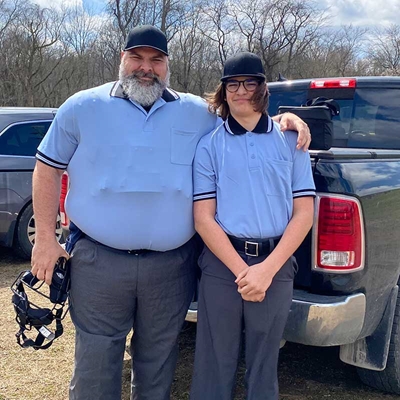Building a Better Auditor: How Umpiring is Like Audit
Blogs Harold Silverman, CIA, CRMA, QIAL, CPA May 31, 2022

Recently, I approached IIA leadership with a formal request (per policy) to begin a part-time job. After a brief discussion of the roles and responsibilities, and assurances on my part that my part-time work would never interfere or create a conflict with my responsibilities as The IIA's director of executive membership, I was granted permission.
With approval in hand, I began taking weekend classes. This new part-time job required me to pass a thorough three-part exam to qualify for work assignments. Further, I have committed to getting CPEs every year to maintain my certification. In taking work assignments, I must first ensure that I am independent. During the performance of my assignments, I must maintain an objective mindset while making judgmental decisions about the adherence of others to defined rules and policies. I almost constantly make judgmental decisions that are criticized by those around me.
I have become a certified baseball umpire in the state of Ohio.
Over the last decade, my children competed in a variety of youth sports. My son played football, basketball, and baseball. My daughter tried lacrosse, softball, and basketball. I volunteered as a head or assistant coach for most of those youth teams. At one point, I calculated that I had been a coach for about 15 different youth sports teams. However, now that they are a high school freshman and sophomore, respectively, my proper role in their activities is to sit outside the fence line and be a fan. My son is playing high school baseball, and my daughter has found her passion in music. As a result, I was left without an after-work hobby.
Yet there was a need I could fill and remain involved in youth sports. Like most states, Ohio is very short of certified officials for many sports. For baseball, there seem to be two contributing factors. First, the proliferation of travel baseball has increased the participation rate and thus the number of games being played. It is not unusual for a 12-year-old to play more than 40 baseball games in a year. All those games need officials. The second and more significant factor is the verbal abuse that officials get on a regular basis. For that reason, many people are reluctant to join the ranks of umpiring, while many umpires are quitting the game they used to love. I can't blame them, but so far, I am having a great time. After decades of serving as an internal auditor, I am prepared to stand my ground in the face of dissatisfaction from parent-coaches in the dugout and, worse, from the non-volunteering parents behind the backstop.
In my full-time role overseeing the executive tier of membership for The IIA, I have the opportunity to speak with CAEs almost every day. Most I talk to are considering adding on executive membership and ask me to articulate to them the value of this add-on membership. The first thing I note is that being a CAE is a lonely role. While you should build strong relationships with management, you are still separate and must be independent. Our executive tier of membership exists to build a community of audit leaders to share leading practices for common challenges.
It is also lonely to be an umpire on the field. Like a CAE who is there to benefit the organization, the umpire is there to make sure that there is opportunity and a level playing field for the kids. Sometimes I have a partner umpire who may have a better angle or a better appreciation for a specific rule, but for the younger ages, I often work alone. Not unlike the camaraderie found at our executive membership events, when I am in the presence of a fellow umpire, I find that we swap stories of tough calls and difficult parents.
As an internal auditor, I know the value of being independent and of maintaining an objective mindset. I know that I will make mistakes when I am crouched behind the plate having to determine, in a fraction of a second, whether a small white ball crossed over any portion of a white home plate at a height no lower than the knees of the kid standing there or higher than his or her mid-chest. I also know that my mistakes are never meant to favor one team or another.
Like my work as an internal auditor, there will always be times when my calls will be argued against with great fervor, even when — or especially when — I am correct. My time as an internal auditor and specifically, almost 15 years as a CAE gave me the strength to communicate with conviction that what I have said is my judgmental call, and I will stand by it. This is true whether I am in the C-suite, in the boardroom — or behind the plate.


